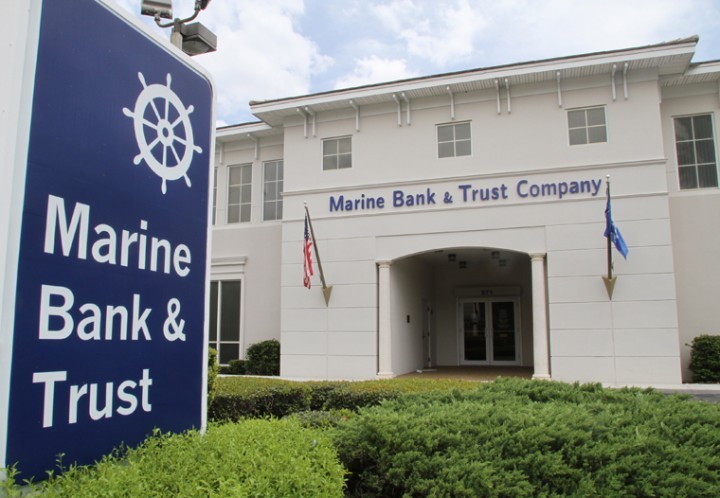INDIAN RIVER COUNTY — Marine Bank & Trust will vigorously defend itself against complaints by the Federal Insurance Deposit Corporation (FDIC) by calling a former top administrator of the agency as one of its expert witnesses.
The agency says the locally owned bank, with headquarters on Beachland Boulevard, is under-capitalized and has too many risky loans.
The FDIC filed paperwork in May claiming the bank engaged in unsafe and unsound banking practices.
Bank officials say that’s not the case and they – like much of Indian River County – were hit hard during the recession when the Florida real estate industry tanked and construction skidded to a halt.
Judge C. Richard Miserendino of the Office of Financial Institution Adjudication ultimately will determine what actions, if any, are appropriate.
His decision could take months.
Bank attorneys from Tallahassee and Tampa carted in 19 boxes of material for the hearing that opened Monday at the new federal courthouse in Fort Pierce.
The bank is appealing the results of a 2010 FDIC examination.
One of the heavy hitters on Marine Bank & Trust’s side will be Paul Fritts, a highly sought-after financial analyst and former career regulator who became the became executive director of FDIC’s divisions of supervision and resolution during the prior banking crisis.
In his FDIC role, Fritts, who lives part time in Sarasota, oversaw the activities of 4,300 bank regulators and a cadre of 300 highly-trained resolution specialists.
His team handled more than 1,200 banking resolutions involving over $140 billion in assets. He has since left the agency and joined a consulting firm.
Chief FDIC litigator John Parker, who is handling the hearing for the government, will find himself going head-to-head with Fritts presumably next week after a two-day pause on Friday and Monday for the federal Martin Luther King Jr. holiday.
At the heart of the matter, the FDIC maintains that the bank needs more capital to absorb risks. The allegations stemmed from a 2010 examination of the bank.
Bank examinations are common but the 2010 exam angered bank officials when the FDIC charged the bank was being lax on its loan underwriting and administration.
“The bank made an excessive amount of loans to borrowers with common risk characteristics, or sensitive to economic financial or business developments,” the FDIC said in its complaint against the bank.
The FDIC charges that the bank had an excessive concentration of commercial real estate, namely speculative construction and development loans, which elevated the bank’s risk to unacceptable levels.
After the 2010 examination, the bank was given a Number 4 rating, the second worst on a scale of 1 to 5 for overall performance and management.
Just two years before that, the FDIC rated the bank a 2, the agency’s second highest rating.
A rating is determined after taking into account the 1 through 5 ratings in areas such as capital, assets, management, earnings and liquidity.
A veteran FDIC official testified Monday said it is possible that the bank will fail if corrective actions are not taken.
Ed Dougherty, one of the bank’s litigators, raised his voice as he took issue with the bank’s composite rating and said there is no possibly of failure as the FDIC alleges.
Years ago, prior to the housing crisis which sent the economy into a tailspin and brought many businesses including banks to their knees, there were few FDIC hearings, said Dougherty.
Now, it’s a different story, he said during a break in Monday’s hearing.
The Marine Bank and Trust hearing is the only one scheduled for the January. But that’s not to say the FDIC hasn’t been busy.
On Dec. 31, the agency released a statement saying the FDIC issued a total of 72 orders during the month of November.
“It’s simply not a complicated case,” said the FDIC’s Parker during opening statements. “…Our goal is make this bank healthier.”
Parker appeared to want to soften the blow to Marine Bank and Trust when he said the charges leveled against the bank should be likened to medicine – something that will make the bank better although the remedy may not be pleasant.
Parker said the quality of the bank’s assets were poor but suggested that none of the problems was an indictment against Bill Penney, president of the bank whose specialty over the course of a three-decade-long career has been providing commercial banking services to business owners and real estate developers.
Dougherty appeared irked at the medicine reference and said the matter could have dire financial implications for the bank.
Dougherty reminded the judge that at the time of the examination, Indian River County was suffering and unemployment at a modern-day high.
He also spoke of the depressed real estate market and how values in some areas dropped between 40 to 60 percent.
The bank did take its share of losses – $1.286 million for the six months that ended in June 2010 – but that was not a trend, said Dougherty.
“It had been profitable,” Dougherty said.
In December 2010, Penney said the bank was on its way to regaining its solid financial footing.
He said earlier losses were due to loans that were restructured to help his clients who were having a tough time in the economy.
From paperwork filed and one cross examination Monday of the FDIC’s Deona Payne, a case worker who oversaw the 2010 examination of the bank, it appears Penney’s camp will contend the FDIC acted in an arbitrary and capricious manner not in accordance with the law.
“The FDIC is operating under a body of ‘secret law’ which gives the bank and the financial industry as a whole no warning of what behavior constitutes a violation…The FDIC, therefore may not constitutionally enforce ‘secret law,'” Marine Bank and Trust said in its response to the FDIC’s charges.

